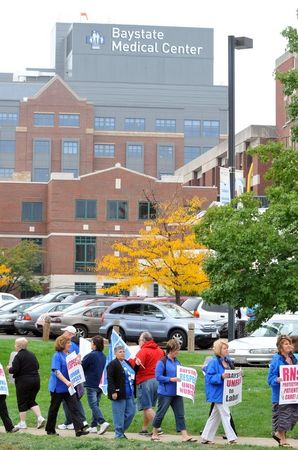 Unionized nurses in Massachusetts have filed a class-action lawsuit claiming their employer owes them overtime pay.
Unionized nurses in Massachusetts have filed a class-action lawsuit claiming their employer owes them overtime pay.
In the lawsuit filed in December 2013, Baystate Visiting Nurse Association and Hospice (BVNAH) nurses said they are required to fill out lengthy paperwork before and after home care visits, work for which they are not paid by Baystate Health.
“It is a basic principle that employers must pay employees for all the hours they have worked,” Shannon Liss-Riordan, an attorney for the nurses, said in a statement. “It is appalling that Baystate would think it can get away without paying them for this time.”
A Baystate Health official disputed the lawsuit allegations.
Nurses “themselves record and submit all hours worked, regular and overtime, and are compensated for all hours they submit,” Steven F. Bradley, the company’s vice president of government and community relations, said in a statement reported by WWLP-22News.
“We haven’t received a single grievance about these issues at BVNAH over the past two years,” Bradley said, calling such lawsuits “standard attack tactics” by nurses’ unions.
According to the Baystate Health website, the not-for-profit company has about 10,000 employees, including the visiting and hospice nurses, and is one of the largest healthcare systems in the state.
The lawsuit is the latest salvo in an ongoing dispute between the Massachusetts Nurses Association (MNA) and Baystate Health.
The nurses’ union recently delivered petitions to Secretary of State William F. Galvin calling for a series of measures, including passage of laws to require greater financial disclosure from hospitals and limits on the salaries of hospital chief executives, The Boston Globe reported.
The MNA states on its website that Baystate Health’s profits are near the top among healthcare companies in Massachusetts and that its chief executive is one of the highest-paid hospital leaders, earning almost $2 million annually.
The union says that amount is 100 times higher than the wages of the lowest-paid hospital worker.
The union also is seeking restrictions on the number of patients assigned to nurses, as well as creation of a fund from the so-called “excess profits” of wealthier hospitals that would be used to support hospitals in under-served communities.
Union representatives told the Globe that if state lawmakers don’t act on the measures they will secure the additional petition signatures needed to put the proposals on the November 2014 ballot.








